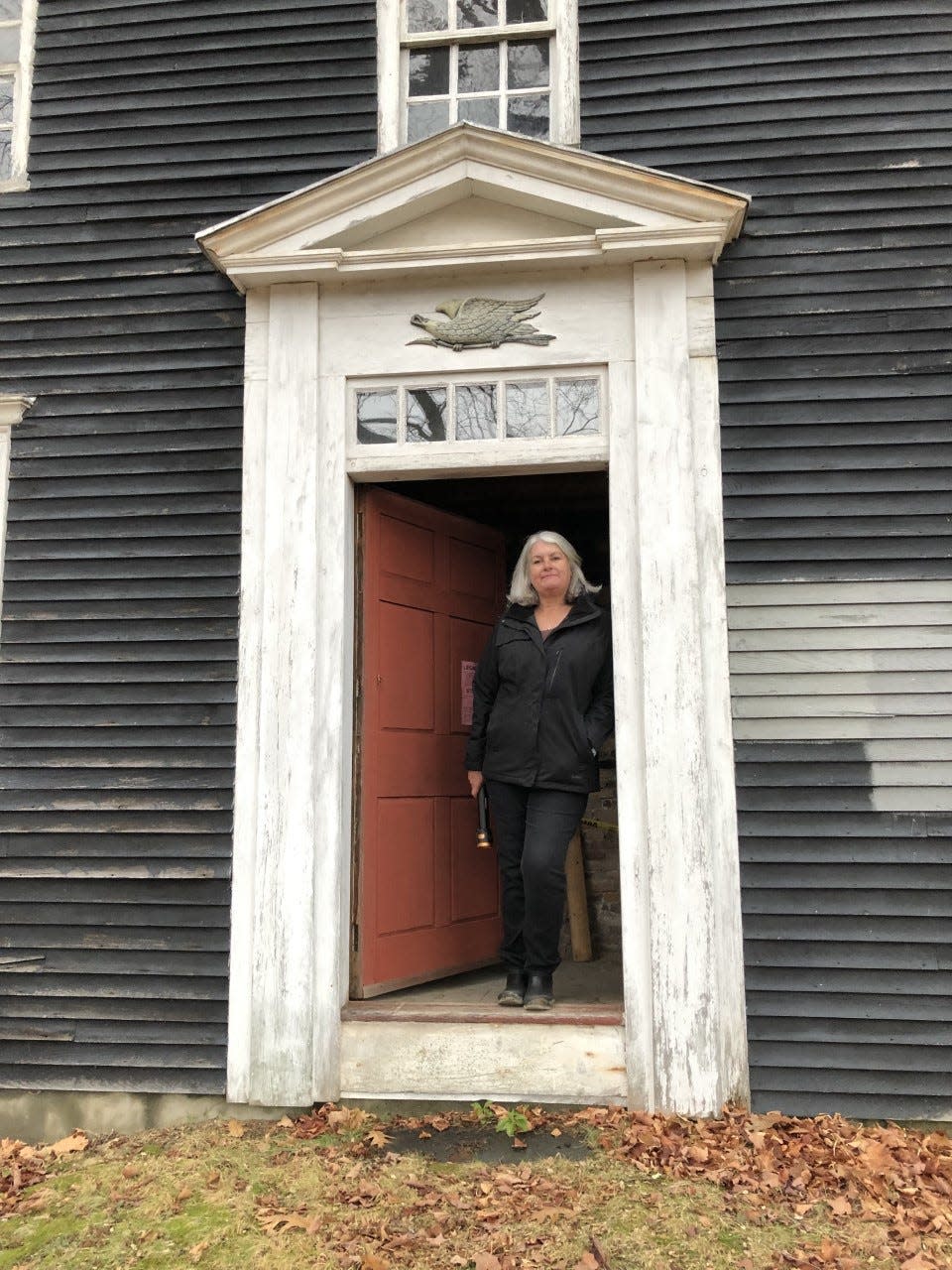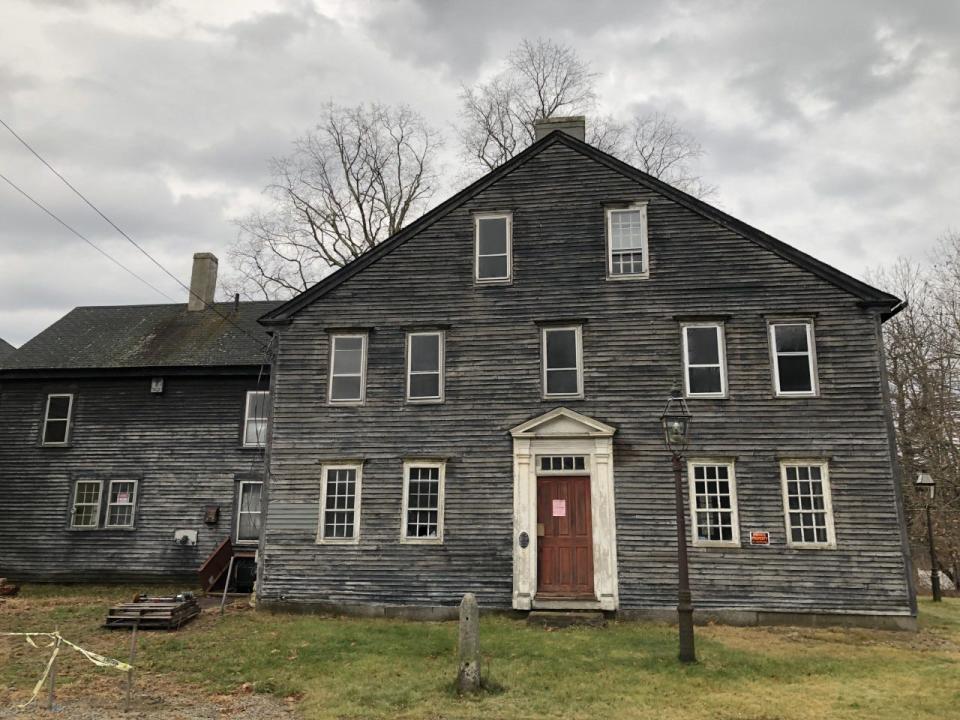'It makes sense': Barnard Tavern plans clear big hurdle, but a key question still looms
KENNEBUNK, Maine – Kari Gates and her husband, Randy, recently cleared a major hurdle in their efforts to transform the historic Barnard Tavern into an inn: the town’s Historic Preservation Commission has approved their plan to deconstruct and reconstruct the old structure.
Next up: the local planning board will hold a public hearing on Monday, Feb. 14, to receive comments on the couple’s hopes of changing the zoning at 9 Barnard Lane from Village Residential to Portland Road Mixed Use.
The Gates property abuts the mixed-use zone, so the couple’s proposal is an extension. During their meeting on Monday, most planning board members spoke in support of the zone change, discussing parking and setback concerns and other issues but agreeing that the proposal is in step with the town’s zoning ordinance and comprehensive plan.
“I think it makes sense to include it in the mixed use zone,” Chair Chris MacClinchey said.

One board member, Richard Trainer, however, described the Barnard property as a “good buffer point” between the mixed-use zone and nearby residences. He said he would not want to add to the mixed-use zone “at this point.”
In a recent interview, Kari Gates said she hopes crews can begin the deconstruction in March, starting with putting in a new foundation and having framing in place as soon as June.
“Everything is ready to go when the ground is ready to go,” Gates said.
Between now and then, the Gateses have at least two more steps: the aforementioned public hearing with the planning board and another appearance before the Historic Preservation Commission, this time to provide materials that meet the conditions of the group’s Jan. 12 approval of their plans for the property. Gates said she hopes to have those materials ready to present to the commission in February.
And then there’s that deed restriction – put in place by the tavern’s previous owner, Jo Johnson, it states that the tavern “may not be torn down.”
Could Johnson and her deed restriction still prove a hurdle?
“Potentially,” Gates said. “I think so ... Time will tell what she does.”
Gates said she is not certain what impact the restriction could play, if any, as she and her husband move forward with their plans on the property. She added that she hopes to meet with Johnson before work begins at the site this spring.
“I’m hoping we can have a conversation with her and explain what we’ve done and show her that this is the best thing for the community,” Gates said.
Attempts to reach Johnson were unsuccessful. Johnson shared her intentions in a Dec. 3 letter to the preservation commission, which included it among the materials for its most recent meeting.
“I have no interest in releasing the restrictive covenant on Barnard’s Tavern,” she wrote.
Four letters in support of the Gateses' plans also were included among the meeting materials.
Back in 2016, Johnson also gave the town the right to enforce the deed restriction – an arrangement about which the town was unaware until early last year. In November, however, voters authorized the town to waive its right to enforce the restriction, giving the Gateses some wind in their sails as they sought approval from the historic commission.
A draining process
When the commission approved the deconstruction and reconstruction on Jan. 12, Gates needed time before she finally realized she had cause for excitement.
Gates said her engineer and lawyer told her that the commission’s decision was a “win.” Given that the project had been on hold for nearly a year, however, Gates said she only felt “numb” after the commission’s hours-long meeting that ended in her favor.
“It just sucked so much energy out of me,” she said.
She felt better the next morning, she added – and she sent an email to her lawyer and engineer that featured animals dancing in celebration.

Gates said she plans to have the inn complete and open for business by Saint Patrick’s Day 2023. Between now and then, however, much work needs to be done. In December, Gates led a tour of the dilapidated structure that demonstrated what will be on the construction crew’s punch list. Due to standing water that has frozen in the basement, a new foundation will be needed, for example, according to Gates.
Gates said the tavern’s exterior will be repaired but would appear the same to passersby on Route 1 as it has throughout its 200-plus-year history.
In December, with a flashlight in her grip, Gates shined beams on evidence of the structure’s disrepair – rotted wood, skewed fireplaces, charred spots from a blaze that ripped through the structure in the seventies. Outside, Gates pointed to the roof and claimed it was ready to collapse.
Some other hurdles, too
Work on the site halted last spring due to the deed-restriction matter and to a “red tag” issued by the town’s code office, according to Gates. The office tagged the project after sashes were removed from the main structure and brought into the barn. Gates said the sashes were relocated on the premises because they did not want them to get damaged by the construction inside the main structure.
“But we didn’t have permission from the historic commission to remove the windows,” Gates said.
The structure – one of Kennebunk’s oldest – was built for Joseph Barnard, one of the town’s first post riders, who used to carry the mail by horse as far away as Boston.
“Perhaps desiring a less strenuous career in his later years, Barnard went on to open a tavern with his wife in their circa 1780 Colonial on Route 1, which proved to be a popular stop for their travelers on their way to Portland,” Portland writer Julie Senk wrote in Down East magazine in 2018.
In addition to being a tavern, the structure has been a hotel, a foster home and a place for local offices and businesses over the centuries, according to Gates.
On Friday, Gates said she is looking forward to seeing the old structure transformed into an inn.
“That’s the heritage of the building,” she said. “This is a huge project. We’re going to make a significant investment in the town.”
This article originally appeared on Portsmouth Herald: Kennebunk Barnard Tavern plans clear key hurdle, but big one remains

